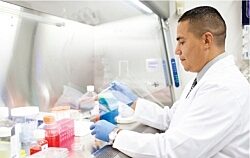Science for Survival

Faculty Spotlight: Jose Trevino, M.D.
Personalizing pancreatic cancer treatment for his patients is the main goal for Jose Trevino, M.D. It may sound like a tall order for such a deadly disease, but Trevino is determined.
“One of the limitations that we’ve had since we first started treating patients with pancreatic cancer is that we really don’t fully understand the disease process,” Trevino said.
Since joining the University of Florida’s division of general surgery’s pancreaticobiliary service in August 2011, the triple-threat researcher, surgeon and oncologist has focused his research on how tumors removed from a human patient grow in an animal model and how different combinations of chemotherapy impact the tumor’s progression. The end goal of his research is to identify the specific chemotherapy cocktail that will work best for each individual patient.
“What I explain to (my patients) is if we get a better understanding of the microenvironment in the mouse, which is in my opinion a more representative form of pancreatic cancer to date, we’ll be able to get a better understanding of the cancer itself, with development of better treatments in the future,” Trevino said.
Currently, the overall survival rate of those diagnosed with pancreatic cancer is about 5 percent, and Trevino is not satisfied. He said one reason the survival rate is so low is because science has not yet developed the “whole picture” of how cancer develops. Past studies have focused on pancreatic tumor cells grown in the static medium of a Petri-dish, but investigating how cancer cells behave in the dynamic environment of a living organism provides more in-depth understanding of tumor growth.
“The future is that ultimately we’re going to recognize that every patient is a little bit different and that personalization is going to be the key to getting better treatment responses,” Trevino said. “Getting there will be very timeconsuming, very in-the-future, but definitely a possibility. And then things get better for our patients and we have a better survival rate.”